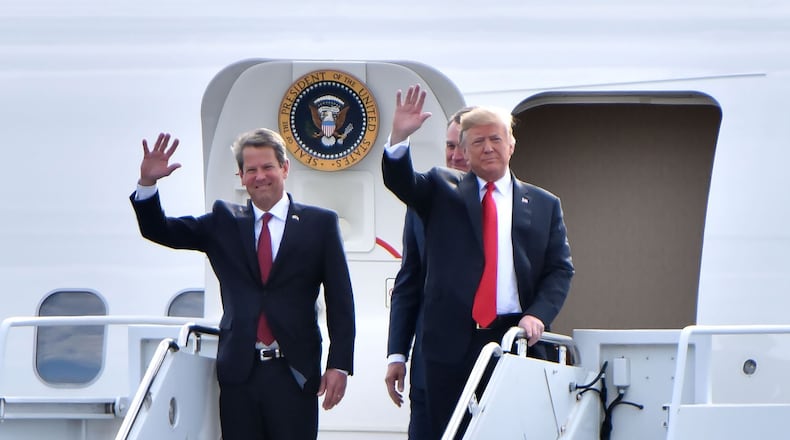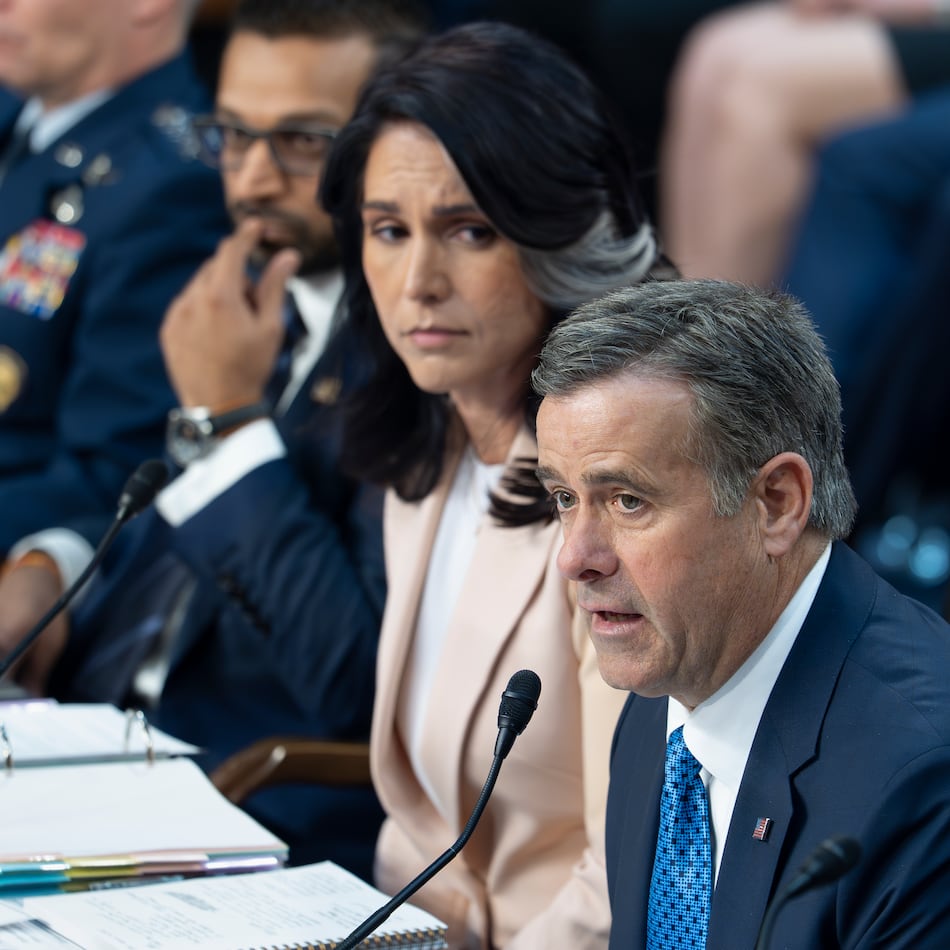Allies turned enemies, Gov. Brian Kemp and former President Donald Trump have forged an uneasy truce as the general election campaign begins and the Republican quest to recapture Georgia starts in earnest.
Theirs isn’t a happy alliance. Kemp skipped Trump’s last rally in Georgia and wasn’t invited to attend his event this weekend in Rome. And the former president only dropped his vendetta against Kemp after Trump’s hand-picked challenger was humiliated in the 2022 primary.
But with a November race that could hinge on Georgia’s vote, the erstwhile rivals might need each other more than ever.
Trump can ill afford to alienate Kemp, who regularly polls as the most popular Republican in the state and managed to win over the same suburban swing voters who doomed Trump’s election chances in 2020.
And Kemp, who has always been cautious about alienating Trump’s loyalists, is eager to deliver his home state back to the GOP column, a feat that would polish his image should he run for the U.S. Senate in 2026 or president two years later.
They have a common interest in recapturing Georgia, the backdrop of one of the GOP’s biggest setbacks in 2020 when Democrats flipped the state for the first time in nearly three decades.
Trump’s all-out effort to subvert Democrat Joe Biden’s win in Georgia is still red-meat grist for his campaign trail rallies — and the basis of an ongoing racketeering trial in Fulton County.
Still, Georgians won’t confuse Kemp’s cautious acceptance of Trump with the enthusiasm of loyalists such as Lt. Gov. Burt Jones, who partied on Super Tuesday with the former president at Trump’s Florida resort.
Kemp’s circumspect approach was evident in a six-word statement from his spokesman, Cody Hall, on where the governor stands after Nikki Haley bowed out of the race: “The governor supports the Republican nominee.”
‘People are going to watch’
The Kemp-Trump saga is well-known even to casual political followers in Georgia.
Kemp modeled his 2018 campaign for governor on Trump’s “America First” brand, and he won a surprise endorsement from the then-president that helped rocket him past the favorite in a GOP runoff. Trump returned to Georgia days before the general election to give Kemp a final boost against Democrat Stacey Abrams.
But their relationship started to fray in 2019 after Kemp picked wealthy executive Kelly Loeffler for an open U.S. Senate seat without Trump’s approval, and it unraveled entirely a year later after Biden eked out a victory in Kemp’s home state.
The governor repeatedly refused Trump’s demand to call a special legislative session that could have invalidated Biden’s victory. And he rebuffed other attempts by Trump’s allies to undermine the election when he certified the results.
An infuriated Trump zealously set out to destroy Kemp and his top allies, swearing that Kemp would “go down in flames” at the ballot box. His prediction was spectacularly wrong.
Unburdened after his reelection, Kemp shifted from never uttering a bad word about Trump to cautious criticism to full-scale broadsides. He called Trump a “loser” for skipping presidential debates, criticized his warm words for North Korea’s despotic leader and warned that Trump-driven distractions will cost Republicans at the ballot box.
Most of all, he urged Trump to ditch his obsession with 2020 and give voters a reason not to back “the lesser of two evils.”
“For our nominee to win Georgia, we need to be focused on the future,” Kemp said this week at a business conference. “We don’t need to be looking in the rearview mirror complaining about the 2020 election.”
But he did not take sides in the nominating contest, despite tight friendships with former New Jersey Gov. Chris Christie and Florida Gov. Ron DeSantis, and an intense courtship to win his favor.
Credit: Audra Melton/The New York Times
Credit: Audra Melton/The New York Times
Kemp’s allies say that delicate treatment of Trump will pay off. Jay Morgan, a former Georgia GOP executive director who is now a well-connected lobbyist, said Kemp’s approach has “made his star shine even brighter” for what lies ahead after 2024. Other Republicans could follow his lead.
“People are going to watch how he handles this,” said Eric Tanenblatt, one of Haley’s most prominent supporters and a longtime Republican operative.
“Trump has to earn the support of Gov. Kemp. And there are things that Trump can do to send signals to Kemp,” Tanenblatt said. “The governor’s going to do what he thinks is best, and I have a lot of faith in him.”
‘A lot tougher’
So how will Kemp approach the 2024 election? Don’t expect him to crowdsurf at a Trump rally, as one of his former rivals did, let alone show up at one.
Credit: Alyssa Pointer / Alyssa.Pointer@ajc.com
Credit: Alyssa Pointer / Alyssa.Pointer@ajc.com
He’s likely to spend more time focusing on down-ballot contests, with his well-financed political machine already pouring money into competitive legislative races.
His approach to Trump could mirror his handling of U.S. Senate nominee Herschel Walker, whose scandal-scarred Trump-backed campaign in 2022 was a source of embarrassment to many GOP leaders. Kemp and Walker largely avoided each other until the final weeks of the campaign season, when the governor cast his support for Walker as a vote against Biden’s policies.
Credit: Steve Schaefer
Credit: Steve Schaefer
The governor’s focus on GOP policies — and not the daily dramas of Trump’s candidacy — offer an example of how he is trying to thread the needle.
He joins Trump in opposing climate change measures that have turbocharged Georgia’s electric vehicle industry because he says it “picks winners and losers.” He backs abortion limits, expanded gun rights and Trump’s conservative picks for the nation’s top court.
And, more recently, Kemp has amplified his criticism of Biden’s immigration policy by invoking the killing of a nursing student in his hometown of Athens. A Venezuelan man authorities say was in the country illegally has been charged with murder in the death.
But Kemp has made clear he won’t play the role of a MAGA cheerleader who condones all that Trump does.
The other day, he knocked Trump for criticizing his decision to roll back coronavirus restrictions in the earliest days of the pandemic. And he warns, frequently, that the November election could become a “race to the bottom” if Trump fails to lay out a compelling vision of the future.
“Trump absolutely can win the race,” the governor said this week. “But I also think he can lose the race. It’s going to be a lot tougher than people realize.”
About the Author
Keep Reading
The Latest
Featured





